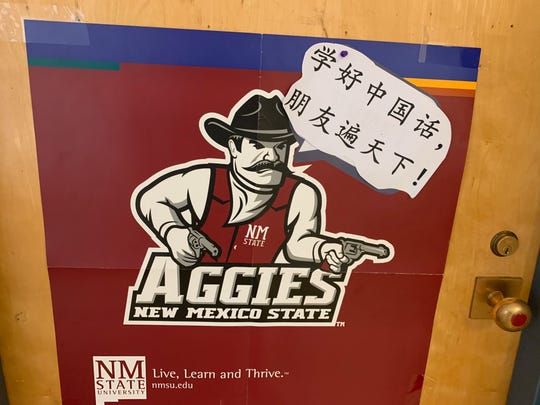
NMSU's Confucius Institute partners with Blue Dragon Dojo on its performance of the Dragon Dance at Branigan Cultural Center. Here, students perform the dance in a Chinese New Year celebration on Jan. 28. 2017. (Photo: Josh Bachman/Sun-News)
In 2018, FBI Director Christopher Wray told the U.S. Senate Intelligence Committee his bureau was concerned that CI's might be used to plant operatives and exploit academia for the purposes of propaganda or espionage. Some senators urged universities in their states to terminate the programs.
Many did just that, especially after the 2019 national defense authorization prohibited universities from hosting a CI if they also received federal funding for Chinese language studies.
More: Review into New Mexico State football lingers over program
The University of Missouri recently announced it was closing its CI because the U.S. state department changed its visa policy to require a certified Mandarin Chinese language teacher in every classroom with a Confucius Institute member. The university said complying with that directive would be cost prohibitive.
Loss of instruction and outreach
The institute at NMSU provided Chinese language instruction there and at the University of Texas at El Paso, as well as dual credit courses at schools in Doña Ana County and elsewhere in New Mexico. The institute also provided teaching materials and cultural activities at the private Cathedral High School in El Paso.
"The institute was providing instructors for the Chinese language classes being taught at the high schools across the district," Las Cruces Public Schools Superintendent Karen Trujillo told the Sun-News, adding that after this semester "it will be difficult to continue offering Chinese as a foreign language option for our students."
Masson said Chinese language instruction in K-12 schools was popular with parents.
"We used to teach Chinese in Hatch and in Vado, and in both places Spanish-speaking parents came to us and said, 'We want our kids to be able to speak Chinese because the pecan buyers and the chile buyers are Chinese, and we want to be able to talk directly to them." Masson recalled during an interview at her office on campus. "If they've grown up in a bilingual world, they know the necessity of being able to meet people in their language."

On a classroom door in Breland Hall on New Mexico State University's Las Cruces campus, university mascot Pistol Pete greets visitors to the Confucius Institute in Chinese on Thursday, Feb. 6, 2020. (Photo: Algernon D'Ammassa/Sun-News)
The institute also hosted speakers' series open to the public, often on topics unpleasant to the Chinese government, as when it screened a documentary about a Tibetan exile in China and hosted a talk by the filmmaker — all with Chinese funding.
On Feb. 26, the institute will present what may be its last public talk, featuring Georgetown University professor and China expert James Millward. His talk will focus on the Chinese government's treatment, including mass internment, of the Uighurs, a Turkic ethnic minority that is predominantly Muslim, inhabiting the northwestern region of Xianjiang.
Despite concerns raised at some CI locations over academic freedom and censorship from Beijing, Masson said NMSU had never experienced opposition from China over the content of its programming or the speakers it hosted.
"We have always stated categorically, explicitly, the minute our granting agency denies us funding for any activity that we plan to do, that's the minute we shut our doors," Masson said.
Closure 'an unfortunate choice'
Hammond, the CI's first director, said speaking events organized by the institute have been a successful outreach opportunity for NMSU, drawing visitors to campus while providing students with exposure to international studies and an important world language.
In an interview on campus, Hammond called the closure "an unfortunate choice that our administration has made, depriving a whole lot of kids of educational opportunities that I just really feel are critical right now."
Hammond argued that if enrollment was a factor in the administration's decision, a better conclusion would be to promote the institute further, since it offered so much instruction and community outreach at very little cost to the university.
"We are serving a community that is generally underserved, and perhaps stands to benefit more from this kind of increased international opportunity," he said.
Federal pressure to close CI's
Although the university does not receive funding from the Department of Defense for language programs, it has worked with the department on a range of programs in research, training and scholarships.
Masson noted that political pressure has been building in Congress to use all federal funding as leverage for inducing universities to close their CI's.

Blue Dragon Dojo member Florencia Visconti demonstrates martial arts during a Chinese New Year celebration at the Branigan Cultural Center on Jan. 28, 2017. NMSU's Confucius Institute collaborates with the dojo to perform the traditional dragon dance in Las Cruces. (Photo: Josh Bachman/Sun-News)
"Every year when the defense authorization acts … come up, senators have tried to put riders in saying if you have a CI on your campus, all DOD funding will be removed," Masson said. "Those haven't passed, but the drumbeat's been there. Any big state institution that gets millions of dollars of DOD funding cannot afford that risk."
"NMSU is committed to international collaborations and we will continue to provide students with opportunities to learn about different cultures and languages," the university's statement said. "We will expand our efforts to build educational and cultural connections with the people of China and provide quality language programs to our students."
Hammond suggested closing the Confucius Institute amounted to walking away from a program that has been delivering on that promise for 12 years.
"It just seems so counterproductive to turn away from an opportunity that is otherwise just not going to be here," he said. "It's not as though the university has the spare resources to create new positions to teach Chinese on campus."
Algernon D'Ammassa can be reached at 575-541-5451,
adammassa@lcsun-news.com or @AlgernonWrites on Twitter.







 Reply With Quote
Reply With Quote